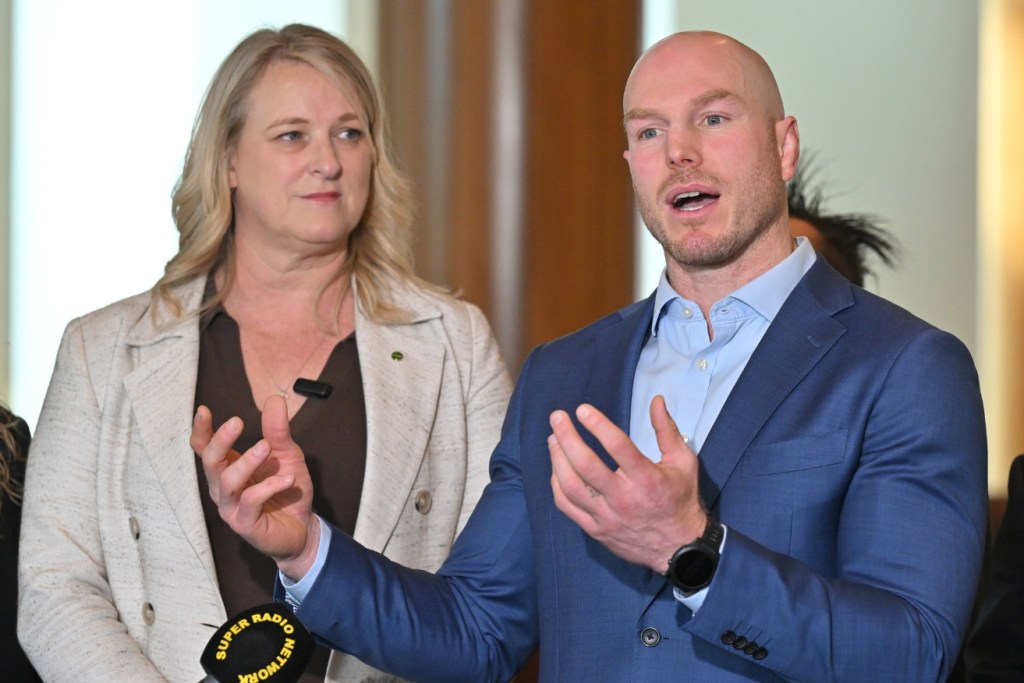Action over words: Bid for adequate housing to be recognised as a human right


Minister for Housing and Homelessness Julie Collins is being urged to officially recognise adequate housing as a human right. Photo: Getty
Australia is in the throes of a housing crisis, and the federal government is being urged to officially recognise adequate housing as a human right as a way of helping.
This week independent ACT Senator David Pocock and North Sydney MP Kylea Tink will introduce legislation to both houses of Parliament that would define the scope and ambition of a broad 10-year national housing and homelessness plan.
The bill proposes establishing a council to represent tenants and home buyers, along with an advocate office to independently monitor the progress of the plan.
From leading academics to former politicians, more than 100 individuals and organisations signed an open letter calling on Housing Minister Julie Collins to legislate the plan, which would follow in the footsteps of Canada’s 10-year National Housing Strategy, launched in 2019.

David Pocock and Kylea Tink want adequate housing recognised as a human right.
Tink said the legislation would bring “clarity and urgency” to tackling one of Australia’s most pressing issues.
Homelessness Australia reported demand for its services rose 7.5 per cent between December and March. This came as even people with full-time work struggled to find homes amid low vacancy rates and the high cost of housing.
University of Sydney AHURI Research Centre director Laurence Troy said the housing squeeze was particularly tough on renters, especially older tenants on fixed incomes.
He said the growing number of younger people finding themselves unable to become home owners would also have a generational impact.
Adequate housing as a human right
Adequate housing was recognised as part of the right to an adequate standard of living under the International Covenant on Economic, Social and Cultural Rights 1966, to which Australia is a signatory.
Australia has also signed on to multiple other international agreements with similar definitions.
But according to Amnesty International, there is no specific legal right to housing enshrined in Australia’s federal legislation.
The federal government’s recognition of adequate housing as a human right would hold symbolic weight, Griffith University Cities Research Institute professor of urban management and planning Paul Burton told The New Daily.
But following that up with action was more important, otherwise it would just be a “nice-sounding statement that doesn’t do anything for somebody who’s currently living in a tent or in the back of their car”.
Bill targets longevity of action
Pocock said legislating the requirement for a plan would help ensure a long-term strategy survived short-term political cycles.
“Having a transparent framework, with agreed national objectives embedded in legislation and greater accountability can help transform how we treat housing from being a vehicle of wealth creation to a fundamental human right,” he said.
“This bill seeks to build on and future proof the work currently under way, and responds to the calls from a huge cross section of stakeholders to enshrine a beefed-up national housing and homelessness plan in legislation.”
Finding the solution to the housing crisis requires action from all forms of government, right down to local councils. But Troy said federal legislation would have more funding and power to force meaningful change.
With the housing crisis decades in the making, it will take further decades to fix.
If the bill passes, the challenge will be ensuring each consecutive government follows through on the necessary changes.
“What we too often see is that the incumbent government commits to something, [then] the opposition who are vying to be the next government … want to try to differentiate themselves,” Burton said.
“Then they fiddle around with [the plan], and they don’t always stick with the same commitment.
“A 10-year period could see three different governments … so getting that consistent commitment is really difficult.”
Most urgent changes needed
Although the housing crisis will likely take multiple decades to resolve, many Australians need help now.
Rents have never been more unaffordable, house prices are rising across many of the major markets, and the number of Australians falling behind on their mortgage repayments has hit the highest level in three years.
Troy said more investment was needed for social housing, following an overall decline in funding since the 1960s, along with state-owned property development companies similar to NSW’s Landcom.
As thousands of Australians languish on social housing waiting lists, many are already living in their cars or tents – but the number of places where they can safely and legally stay overnight is limited.
Burton said in the short term, local councils should look at allocating vacant blocks in appropriate locations for these people to set up camp while Australia’s housing crisis was addressed.
Although the idea of a campsite for homeless people near residential areas may be unappealing, he said Australia was veering closer to the reality of countries like the US, where homeless line the streets of major cities such as San Francisco and Los Angeles.
“That’s not to say living in a tent or in a car fulfils [the] obligation to provide housing as a human right, it absolutely doesn’t,” Burton said.
“But until we can meet that obligation properly, I think we’ve got to look at what are you going to do tonight for somebody who’s sleeping in a tent or a car.
“To pretend that that’s not existing or that if we provide that, we’re encouraging people who are doing this because it’s a ‘lifestyle choice’ – these are … bogus arguments.”








